

Sans titre. Sans titre.
Gender Research. Open Knowledge Repository. TC. Gender mainstreaming in the work of the World Bank. Gender mainstreaming in the work of the World Bank - identifying the potentials and challenges Presentation at a panel organized by the World Bank as a side-event during the 46th session of the Commission on the Status of Women, 4-15 March 2002 by Carolyn Hannan Director, Division for the Advancement of Women United Nations 5 March 2002 I am very pleased to have the opportunity to comment on the World Bank document: Integrating Gender Into The World Bank's Work.
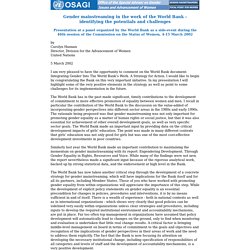
A Strategy for Action. The World Bank has in the past made significant, timely contributions to the development of commitment to more effective promotion of equality between women and men. Similarly last year the World Bank made an important contribution to maintaining the momentum on gender mainstraeaming with its report: Engendering Development. Before giving attention to the strategy, let me say a few words on the particular constraints that face gender mainstreaming in the World Bank. IV. La banque de « savoirs » I. La Banque mondiale et les organismes affiliés.
La Banque mondiale - Jean-Pierre Cling, François Roubaud. Browse Systematic Country Diagnostics by Title. Politiques environnementales et sociales dans le cadre des projets. Lorsque nous fournissons aux gouvernements un financement pour investir dans des projets - tels que la construction d'une route, la fourniture d'électricité aux citoyens ou le traitement des eaux usées- nous visons à garantir la protection des personnes et de l'environnement contre les impacts négatifs potentiels.
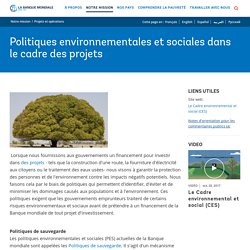
Nous faisons cela par le biais de politiques qui permettent d'identifier, d'éviter et de minimiser les dommages causés aux populations et à l'environnement. Atlas 2017 des Objectifs de développement durable : un nouvel outil pour le suivi des données et des progrès. La Banque mondiale a le plaisir de présenter l’Atlas 2017 des Objectifs de développement durable (ODD) (a).
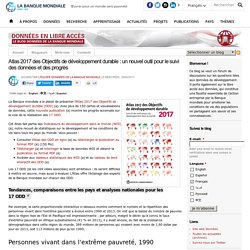
Avec plus de 150 cartes et visualisations de données, cette nouvelle publication (a) montre les progrès accomplis sur la voie de la réalisation des 17 ODD. Cet Atlas fait partie des Indicateurs du développement dans le monde (WDI) (a), notre recueil de statistiques sur le développement et les conditions de vie dans tous les pays du monde. Vous pouvez : Les 17 ODD (et les 169 cibles associées) sont ambitieux : ils seront difficiles à mettre en œuvre, mais aussi à évaluer. L’Atlas offre l’éclairage des experts de la Banque mondiale sur chacun des ODD. Tendances, comparaisons entre les pays et analyses nationales pour les 17 ODD. Let’s work together to make land rights for women a reality. Overview. Gender equality is not only a social and moral imperative, but also an economic need.
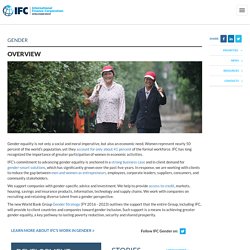
Women represent nearly 50 percent of the world’s population, yet they account for only about 41 percent of the formal workforce. International Development Association. Involuntary Resettlement. Whereas 541 million people were affected (injured, homeless, displaced, evacuated or requiring immediate assistance) by natural disasters during 1970-1979, an estimated 2.3 billion will be affected by the end of this decade.
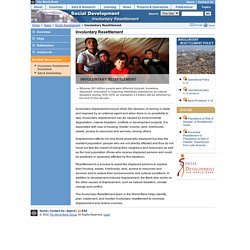
Involuntary displacement occurs when the decision of moving is made and imposed by an external agent and when there is no possibility to stay. Involuntary displacement can be caused by environmental degradation, natural disasters, conflicts or development projects. Profil du genre pays. Gender and Development. UNRISD research has both led and continually challenged the field of gender and development, contributing to feminist scholarship and activism, and bringing evidence to bear on the practice of development.
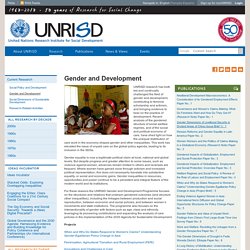
Recent analysis of the gendered structure of social welfare regimes, and of the social and political economy of care, have shed light on how the unequal distribution of care work in the economy shapes gender and other inequalities. This work has elevated the issue of unpaid care on the global policy agenda, leading to its inclusion in the SDGs. Gender equality is now a legitimate political claim at local, national and global levels. World Bank global practices and cross-cutting solution areas - Bretton Woods Project. In 2013, the World Bank Group adopted a new strategy which introduced two goals: to “end extreme poverty” by 2030 and “promote shared prosperity” for “the bottom 40 per cent of the population in every country” (see Observer Autumn 2013).
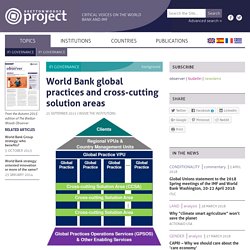
The strategy identified three pillars to support developing countries to achieve the two goals in a sustainable manner: delivering development solutions for clients; servicing clients as “one World Bank Group”; and leveraging the resources and expertise of partnerships. A new operating model was put in place in July 2014. The new model is centred on a global matrix of six client-facing regional units with country offices in most borrowing countries, 14 global practices (GPs) that bring together technical staff working across all six regions, and five cross-cutting solution areas (CCSAs), smaller teams focused on global issues, such as gender; fragility, conflict, and violence; and climate change, which cut across countries and sectors. Gender Overview. The World Bank Group works with public- and private-sector clients to close gaps between males and females globally for lasting impact in tackling poverty and driving sustainable economic growth that benefits all.
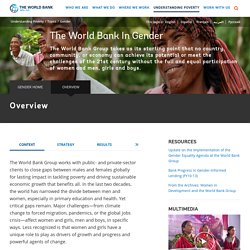
In the last two decades, the world has narrowed the divide between men and women, especially in primary education and health. Yet critical gaps remain. Africa Gender Innovation Lab (GIL) The World Bank’s Africa Region Gender Innovation Lab (GIL) conducts impact evaluations, which assess the outcome of development interventions in Sub-Saharan Africa, to generate evidence on how to close the gender gap in earnings, productivity, assets, and agency.
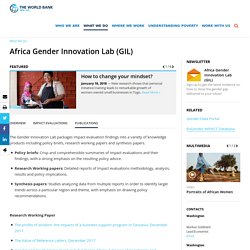
With the results of impact evaluations, the GIL supports the design of innovative, scalable interventions to address gender inequality across Africa. The goal is to enable project teams and policymakers to advocate for better gender integration using evidence. Context. Gender Home. INSURANCE. Globally, the socioeconomic status of women, their decision-making ability, and their power to influence household spending is increasing.
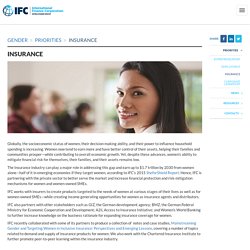
Women now tend to earn more and have better control of their assets, helping their families and communities prosper—while contributing to overall economic growth. Yet, despite these advances, women’s ability to mitigate financial risk for themselves, their families, and their assets remains low. Performance Standards. Gender “mainstreaming” — not (actually) lost in translation. Available in 中文 Whenever and wherever the Bank supports a project, to “mainstream” gender is one of the goals. The idea is a fairly simple one. IFC's Priorities in Gender. IFC's Priorities in Gender Too often, women's private-sector participation is under-valued. Integrating women better into business operations can increase companies’ profitability and contribute significantly to shared prosperity. However, women have less access to equal employment opportunities and capital to grow their businesses, experience high levels of sexual violence, are often barred from owning or inheriting land or other property, and have less income to invest for the future.
IFC and its partners are addressing these challenges by working with clients to ensure that women and men can equally participate in creating business value and secure influence and income for themselves. When men and women alike are allowed to make decisions, pursue employment, entrepreneurship, and leadership, societies can reach their economic potential (PDF). Gender mainstreaming in resettlement processes: Have we done enough? Last August, I visited Quang Ngai, a central coastal province in Vietnam, to collect data for a survey on women’s participation in resettlement activities.
I expected our first meeting with the local community to be short and uncontroversial. It wasn’t. “We, women? Let’s work together to make land rights for women a reality. Gender. Development is challenging even under the best of conditions. It can be even more difficult when the local context is complex, and when some groups face the risk of losing out as part of the development process. The World Bank's environmental and social safeguard policies are a cornerstone of its support to sustainable poverty reduction. The objective of these policies is to prevent and mitigate undue harm to people and their environment in the development process.
On the people side, the World Bank has two specific policies that support this objective. Gender Data Portal.